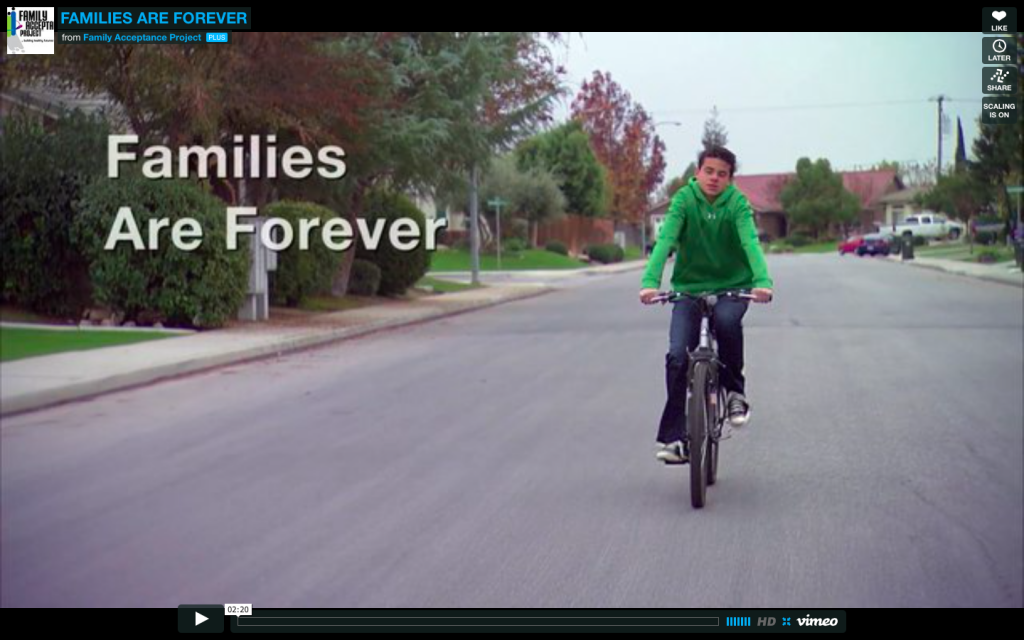Families Are Forever: An Introduction to the Film

Prepared by Dr. Robert A. Rees and presented at the opening of the 2013 Sunstone Symposium in Salt Lake City, Utah, on July 31, 2013
by Robert A. Rees
Families are Forever, a documentary film produced by the Family Acceptance Project at San Francisco State University, chronicles the experience of one faithful Latter-day Saint family as they come to terms with their extended family and their congregation when they discover that their adolescent son is gay. The film is a powerful and poignant in exploring the real-life struggle of parents faced with the conflict between faith and family over one of the defining social issues of our time.
Families are Forever beautifully illustrates the theme of the 2013 Sunstone Symposium since it deals with the various bodies within Mormonism. In his letter to the Corinthians, Paul uses an extended metaphor of the body to teach us about the body of Christ (the church and its constituent members). That image also applies to families, groups, organizations and nations—social structures in which we live and move and have our being. In reality, we belong to bodies of other bodies—individuals to whom we are related or connected—biologically, socially, or spiritually. Families are Forever is based on one such body, a faithful Mormon family, and its relationship to other bodies (their extended family, congregation, community and church). All of these bodies, to follow Paul’s metaphor, are interrelated and co-dependent—and the health of each as well as the whole is dependent on the health of each member of the respective bodies. What Families are Forever illustrates is that the healthy functioning of each of these bodies is dependent on love and that when individual members of these bodies fail to love other members, fail to nourish and sustain any member within it, both the individual bodies and the body as a whole suffer.
For a long period of time, as Latter-day Saint families and congregations and as a church, contrary to Paul’s admonition, we have said to our LGBT members whom we deem “less honorable” and “less presentable,” “We have no need of you; you are not part of our body.” Paul condemns such behavior, saying, “But God has so composed the body, giving more abundant honor to that member which [we perceive] lacked, so that there may be no division in the body, but that the members may have the same care for one another.” Clearly as families and as congregations we not only have not given more abundantly to our LGBT members, we have excluded them from our various bodies—including our bodily (physical) presence. Paul says the consequence of our having done so is that “if one member suffers, all the members suffer with it.” As families and as congregations, we have suffered too long over this issue. The family featured in the film shows us what happens when all of the members of a family honor a member who is in pain: “If one member is honored, all the members rejoice with it. So that there may be no division in the body, but that the members may have the same care for one another. (see 1 Cor. 12: 12-31, NIV). Families are Forever demonstrates how one family can set the example for other families, for congregations and for the Church as a whole by choosing love —“until we all reach unity in the faith and in the knowledge of the Son of God and become mature, attaining to the whole measure of the fullness of Christ” (Eph. 4:13, NIV)
Families are Forever is based on extensive research conducted by the Family Acceptance Project (FAP) at San Francisco State University on the relationship between family acceptance and rejection of lesbian, gay, bisexual and transgender (LGBT) adolescents and their health risks (including for suicide and HIV) and well-being. Based on its findings, the FAP has been developing the first evidence-based approach to help ethnically and religiously diverse families support their LGBT children. This work has built on decades of research on sexual orientation and a growing body of research on gender identity, including scores of studies since the early 1970s on the needs and experiences of LGB adolescents. As part of this work, the Family Acceptance Project has been developing family education materials to help families and providers promote well-being, to address significant misinformation about sexual orientation and gender identity among children and adolescents, and to decrease high levels of risk for suicide, homelessness and other negative outcomes for LGBT adolescents. These materials are designed to strengthen families and to help support LGBT children and adolescents in the context of family, culture and religious beliefs.
Family Acceptance Project materials include the first “Best Practice” resources to prevent suicide among LGBT people and the only Best Practice resources for suicide prevention for Mormon families with LGBT children. A core part of this work includes developing a series of broadcast-quality family education films that show the journey of ethnically and religiously diverse families from struggle to support of their LGBT children. These films provide culturally-grounded models of family support that give LGBT youth and families hope, help decrease risk, and increase family connectedness and well-being. Families are Forever is the latest addition to this series of short documentary films from the Family Acceptance Project. This session includes an introduction describing the empirical foundation for this work, a showing of the film, and a panel discussion on the critical role of family support for strengthening families, congregations and communities.
